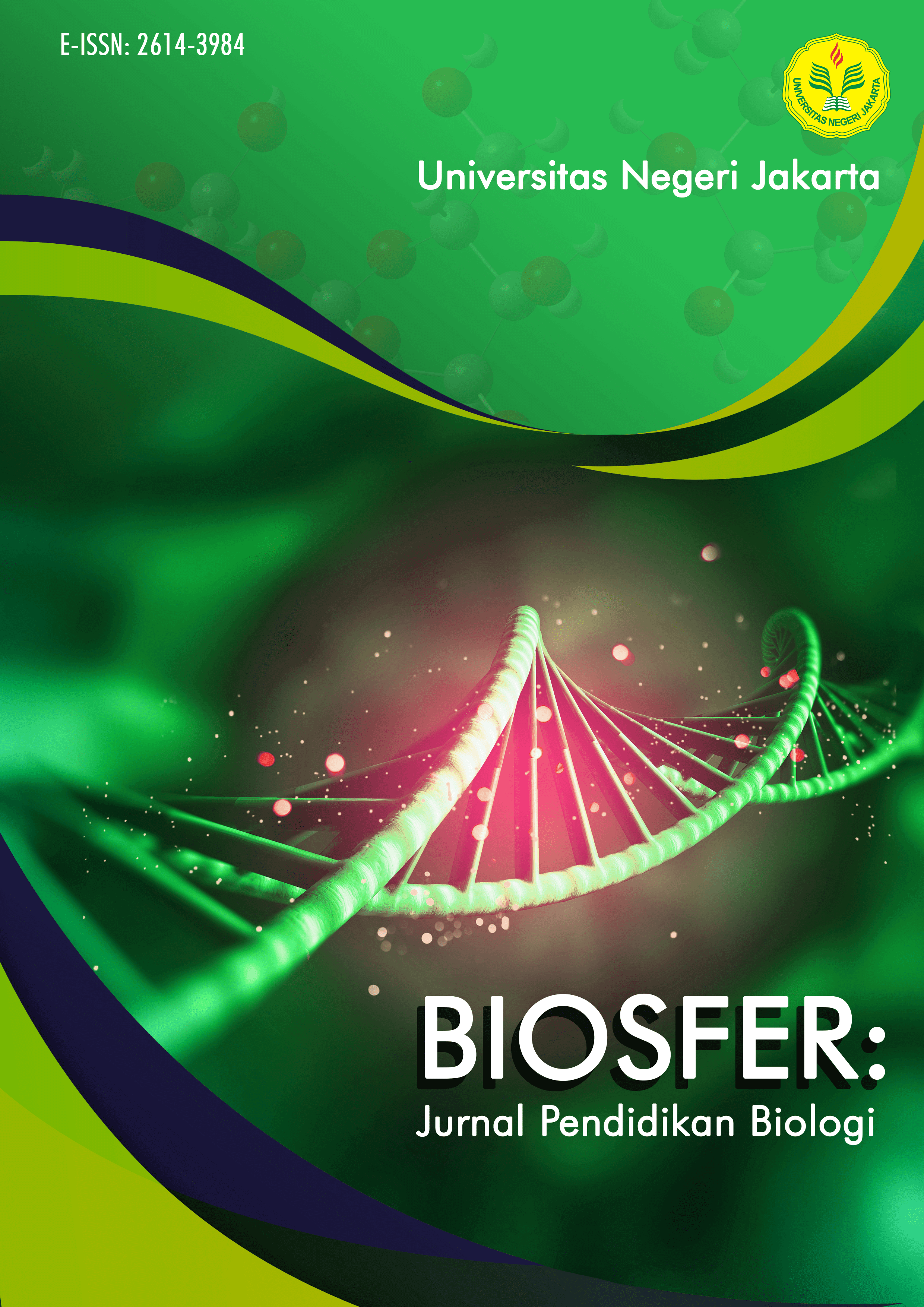The Improving evidence-based argumentation on socioscientific issues through problem-based learning in science students
DOI:
https://doi.org/10.21009/biosferjpb.35534Keywords:
Evidence based argument, PBLAbstract
In the scientific education, improving the argumentation skills in socioscientific issues was very important to educate young people as an active society. The aim of this research was to evaluate the implementation impact of problem based learning to the students skils of evidence based argumentation of socioscientific issues.Total of 21 students of Grade XII MIPA of senior high school at surakarta city were used as the sample in the learning process with biotechnology topic. The times taken for the learning activity were 4 week with 4 times of class meeting every week. Pre-test and post-test were applied to 21 students in order to measure of students skills in constructing the argument of socioscientific issues. . The differences between pre-test and post-test scores for each aspects of evidence-based argument, in sequence, are as follows: 61,11 and 92,06 for claims; 30,16 and 84,13 for evidence; and 28,97 and 78,17 for connection claim to evidence. Statistically test for Wilcoxon rank test score for evidence based argument resulted p-value (0,00) which was < 0,05. This means that score of evidence based argument was improved significantly. In the case of qualitative data used, observation during learning process, learning transcipt, result of students works within learning activity as well as interview activity showed that PBL learning had improved the skill of evidence-based argument of science students.
References
Alvarez-Cedillo, J., Aguilar-Fernandez, M., Sandoval-Gomez, R., & Alvarez-Sanchez, T. (2019). Actions to be taken in mexico towards education 4.0 and society 5.0. International Journal of Evaluation and Research in Education, 8(4), 693–698. https://doi.org/10.11591/ijere.v8i4.20278
Ary, D., Jacobs, C., Sorensen, C., & Raavieh, A. (2010). Introduction to Research in Education (8 edition). Nelson Education, Ltd.
Belland, B. R. (2010). Portraits of middle school students constructing evidence-based arguments during problem-based learning: The impact of computer-based scaffolds. Educational Technology Research and Development, 58(3), 285–309. https://doi.org/10.1007/s11423-009-9139-4
Belland, B. R., Glazewski, K. D., & Richardson, J. C. (2011). Problem-based learning and argumentation : testing a scaffolding framework to support middle school students ’ creation of evidence-based arguments. Instructional Science, 39, 667–694. https://doi.org/10.1007/s11251-010-9148-z
Berland, L. K., & McNeill, K. L. (2010). A learning progression for scientific argumentation: Understanding student work and designing supportive instructional contexts. Science Education, 94(5), 765–793. https://doi.org/10.1002/sce.20402
Cavagnetto, A. R. (2010). Argument to Foster Scientific Literacy: A Review of Argument Interventions in K-12 Science Contexts. In Review of Educational Research (Vol. 80, Issue 3). https://doi.org/10.3102/0034654310376953
Cebesoy, U. B., & Oztekin, C. (2017). Genetics Literacy: Insights From Science Teachers’ Knowledge, Attitude, and Teaching Perceptions. International Journal of Science and Mathematics Education, 1–22. https://doi.org/10.1007/s10763-017-9840-4
Creswell, J. W. (2009). Research Design: Qualitative, Quantitative, and Mixed Methods Approaches. In Muqarnas (Vol. 8). https://doi.org/10.1163/22118993-90000268
Fahy, K. (2008). Writing for publication: Argument and evidence. Women and Birth, 21(3), 113–117. https://doi.org/10.1016/j.wombi.2008.04.001
Foong, C. C., & Daniel, E. G. S. (2010). Assessing student’s arguments made in socio-scientific contexts: The considerations of structural complexity and the depth of content knowledge. Procedia - Social and Behavioral Sciences, 9, 1120–1127. https://doi.org/10.1016/j.sbspro.2010.12.294
Han-Tosunoglu, C., & Ozer, F. (2022). Exploring Pre-service Biology Teachers’ Informal Reasoning and Decision-Making About COVID-19. In Science and Education (Vol. 31, Issue 2). Springer Netherlands. https://doi.org/10.1007/s11191-021-00272-5
Herman, B. C., Clough, M. P., & Rao, A. (2022). Socioscientific Issues Thinking and Action in the Midst of Science-in-the-Making. In Science and Education (Vol. 31, Issue 5). Springer Netherlands. https://doi.org/10.1007/s11191-021-00306-y
Kara, Y. (2012). Pre-service biology teachers’ perceptions on the instruction of socio-scientific issues in the curriculum. European Journal of Teacher Education, 35(1), 111–129. https://doi.org/10.1080/02619768.2011.633999
Macagno, F. (2016). Argument relevance and structure. Assessing and developing students’ uses of evidence. International Journal of Educational Research, 79, 180–194. https://doi.org/10.1016/j.ijer.2016.07.002
McNeill, K. L., & Martin, D. M. (2011). Claims, Evidence, and Reasoning : Demystifying data during a unit on simple machines. In Science and Children (Issue Nrc 1996, pp. 52–56).
OECD. (2013). What Students Know And Can Do: Student Performane In Mathematics, Reading, And Scince: Vol. I (pp. 215–251). https://www.oecd-ilibrary.org/education/pisa-2012-results-what-students-know-and-can-do-volume-i_9789264201118-en
OECD. (2019). PISA 2018 Science Framework. In PISA 2018 :Assesment and Analytical Framework (pp. 97–117). OECD Publishing.
Owens, D. C., Sadler, T. D., & Zeidler, D. L. (2017). Controversial issues in the science classroom. Phi Delta Kappan, 99(4), 45–49. https://doi.org/10.1177/0031721717745544
Sadler, T. D., & Donnelly, L. A. (2006). Socioscientific argumentation: The effects of content knowledge and morality. International Journal of Science Education, 28(12), 1463–1488. https://doi.org/10.1080/09500690600708717
Tan, O.-S. (2003). Problem-based Learning Innovation: using problem to power learning in the 21st century. Cengage Learning Asia Pte Ltd.
Tias, E. P. A. N. (2022). Facing the challenges of society 5 . 0 digital character competence : Review of education and teaching strategies for prospective teachers. International Conference on Education, 1(June), 155–161. http://www.seminar.uad.ac.id/index.php/ICE/article/view/9311
Zeidler, D. L., Herman, B. C., & Sadler, T. D. (2019). New directions in socioscientific issues research. Disciplinary and Interdisciplinary Science Education Research, 1(1), 1–9. https://doi.org/10.1186/s43031-019-0008-7
Downloads
Published
How to Cite
Issue
Section
License
The Authors submitting a manuscript do so on the understanding that if accepted for publication, copyright of the article shall be assigned to Biosfer: Jurnal Pendidikan Biologi (Biosferjpb) and Departement of Biology Education, Universitas Negeri Jakarta as publisher of the journal.



